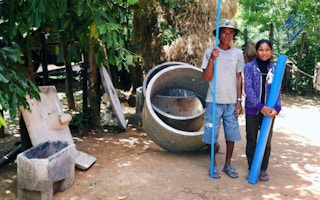Every year, organisations from across the water, sanitation and hygiene sector (WASH) gather in Stockholm for the annual World Water Week, a conference to reflect on progress from the year and look ahead to future innovations. The theme of this year’s conference was water cooperation – building partnerships.
After one week in the trenches of Stockholm’s conference centre, I saw both positive signs of progress and key areas where the sector must collectively pivot for greater impact – this includes in establishing transformative partnerships that must emerge to meet the challenges of a planet with a population of 9 billion people by 2050.
Signs of Progress
I was impressed by what the freshwater conservation community – led by Conservation International, The Nature Conservancy, and Africa Biodiversity Collaborative Group – is up to. Recognising the need to better integrate programming, these organisations have partnered to better incorporate water, sanitation and hygiene (WASH) programming with conservation and ecosystem protection efforts. They will soon release a set of guidelines aimed at supporting this kind of integration at the programme level.
I was also encouraged to learn that the World Bank’s Water and Sanitation Programme is partnering with WaterSHED in Cambodia to enable greater adoption of their “Hands-Off” approach to capitalise on market forces and the increased sale of toilets – 54,000 have already sold in Cambodia – and to ensure greater sustainability and formalisation of that market.
“
Sustainability is certainly on the minds of those thinking about full water and sanitation coverage, yet the push to scale and reach more beneficiaries masks the need for other indicators that can be proxies for sustainability and which will be critical for avoiding the failures the WASH sector has been criticised for in the past
Also during World Water Week, Water For People, the organisation where I work, shared an agreement we have made with IRC Water and Sanitation Centre and WSUP to collaborate by aligning current and future programming to achieve Everyone Forever. This means behaving as a network, sharing ideas, resources and skills across organisations to maximise effectiveness and accelerate impact.
Room for Improvement
Despite these signs of creative and collaborative partnerships, there were also clear areas where more work is needed.
One specific area is around the apparent disconnect between those focused on the political process of the post Millennium Development Goals and those looking at long-term sustainability issues, like finance. Sustainability is certainly on the minds of those thinking about full water and sanitation coverage, yet the push to scale and reach more beneficiaries masks the need for other indicators that can be proxies for sustainability and which will be critical for avoiding the failures the WASH sector has been criticised for in the past.
For example, monitoring for access at one point in time does not give an indication of sustainability of the services required for ongoing access. Perhaps one way of bridging this gap is to work together to assess the capacity of permanent local institutions that are responsible to support service delivery and partnering to build that capacity where it is weak.
Other exciting updates emerging from World Water Week included:
- Launching the beta version of the WASHCost Calculator, a new online tool to help practitioners perform budget calculations and sustainability checks by assessing life cycle costs for WASH programmes.
- A session with Mayors from Bolivia, Ghana and Uganda who spoke about achieving sustainable WASH coverage in their districts and how it could serve as a springboard for other districts within their countries.
- The release of a debate series by the Skoll World Forum called Getting to Full Water and Sanitation Coverage. The debate includes thought provoking contributions from organisations including: Water.org, WSP, WASH Advocates, UNICEF, Winrock International and others.
- News that the Global Sanitation Fund, which was launched by the Water Supply & Sanitation Collaborative Council in 2008, has catalysed over 2 million people to live in environments free from open defecation
- The introduction of a WASH pledge by WBCSD to educate companies that there is business value in getting involved to solve WASH challenges.
Overall, this World Water Week revealed that while progress on innovative partnerships is certainly on the rise the sector must continue working in unique and transformative ways that result in sustainable impact. After working in international development for the past 20 years, and attending several World Water Week conferences, I believe the development sector must move toward blurring organisational lines – it is not about the impact of one organisation but about the collective impact we can achieve as a sector forming bold and unexpected partnerships. I am inspired by the words of Ravi Narayanan, from Arghyam, who said, “We cannot be lone rangers, we will have to work together … let go of your name and you will find peace.”
John Sauer is head of external relations, international programmes at Water for People. This post originally appeared here.

















